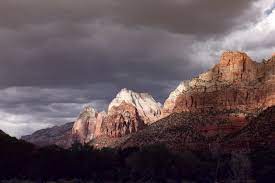By Curt Collier
I’ve almost died several times. Mostly just the usual stuff—getting trapped underwater until I nearly passed out, having a knife held at my throat during a violent confrontation, getting caught in hurricanes and tornadoes, major car crashes that totaled my truck (twice), getting buried in a collapsed sand tunnel, being chased by a psychotic stalker in his car, seeing Trump elected . . . you know, those sort of things. But in each of these situations, somehow I knew it was going to be OK. It’s not that I think I’m immortal. The sad side effects of aging have confirmed my body has an expiration date. I’ve also lost several people I love, including my own sister when I was 13, which alerted me all too well that life is fragile. Yet, I’m not one of those who think that life is a gift.

The summer after my sister died, my parents decided to take us on an extensive camping trip. We were supposed to hike the Grand Canyon and see other national parks on a journey meant to heal our broken hearts. When we arrived, however, we hadn’t anticipated that at 8,000 feet in elevation, the North Rim of the canyon could experience a freak snowstorm. Freezing in our tents at night, my parents made the decision to head over to Zion National Park, which was lower in elevation.
The heavy snowstorm that blanketed us at Grand Canyon had followed us and turned into torrential rain at Zion. As we approached the park, the road was littered with boulders that had tumbled off the hillside because of the flash floods. That should have been enough to turn most people away, but given our emotional state it all seemed to be par for the course.
Once we set up camp in the rain, my father announced that he wanted to take us on a difficult hike up to Angel’s Landing the next day as a sort of tribute to our sister. This is a grueling but beautiful hike. The last three thousand feet of trail you pull yourself up with chains. (I took my mother back there on her 80th birthday to the utter amazement of others sharing the trail.) Due to the heavy rain, my dad suggested we do a smaller hike that day to Weeping Rock, an outcrop with a small waterfall. If you’ve not seen it, you can hike behind the falls and enjoy a vista of the valley through gently cascading water.
Torrential rain began to fall
No one else was on the trail, and as we made our way the clouds continued to darken. We knew rain was coming, but the intense rain showers were often brief, typical of rainfall in the desert Southwest. Enjoying the vista from the natural alcove behind the falls, I remember, the sky suddenly turned very dark and torrential rain began to fall. We counted ourselves lucky to be out of such intense rain, but suddenly the falls above us grew stronger and darker. A large cascade of falls suddenly developed and blocked the only trail into the narrow alcove and swiftly all we saw was water. That was scary enough, but then the water turned to mud and rocks and my father shouted “landslide, get back!” above the noise.
We quickly huddled together and held on to one another as mud and rocks began to thunder down in front of us, and then on top of us. We were caked with mud. Huddled together, we debated what to do next: stay in the narrow outcrop and risk being covered by the landslide, or risk running through the heavy, muddy cascade covering the trail and risk being washed downstream. Finally, we all concluded that remaining there frozen was not a viable option, and we decided to lock arms and make a run for it. Which is what we did.
No food or electricity
As we emerged, we were spotted by park rangers and volunteers who had come to look for people trapped. They were shocked to find people caked in mud emerge from the falls. The park was flooded, landslides had shut down the entrance, and we waited a couple of days until we were bulldozed out of the park. There was no food or electricity, and we had to wash the mud off in a freezing shower.
What I profoundly remember from that incident, is looking into the mud-stained faces of my parents and brothers and deciding together to choose taking a risk to save ourselves from harm, even if we weren’t sure we would be better off in taking that risk.
A source of hope and resiliency
Life for me is not a gift, but an ongoing choice. So many of you have struggled in your lives, too. You’ve seen challenges arise, faced dire medical conditions, and have your own stories to share, but you also know what I mean about choosing to go forward no matter what. My message for you in the new year is to continue to take risks, to set aside your fears, and to choose life again and again. Such an orientation is also a wellspring of hope and a source of resiliency. True, not all risks will work out, and occasionally bad things do happen despite our determination. But, speaking on behalf of this community, we remain here also, hoping to catch you if you fall. That’s what a community is all about.
Curt Collier is leader of the Ethical Culture Society of Bergen County.


